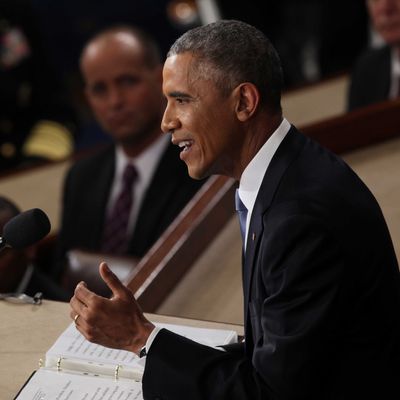
President Obama’s State of the Union address represents the first expression of Democratic politics in the post-recession era. This is the first moment the political debate centers not on how to pull the economy out of the recessionary morass, but how to spread its benefits more evenly. This is naturally more favorable terrain for any Democrat, and vindication for a president who can now put behind him six years of his opponents warning that his policies had brought, or would soon bring, immiseration and bankruptcy. Referring to the passing of the crisis, Obama declared, “Tonight we turn the page.” And, oddly, the turning of the page brings him back to a moment of his own humbling: his stammering first presidential debate against Mitt Romney.
At the Denver presidential debate, Romney had shocked Obama by casting himself not as the free-market stalwart defender of capital as which he had previously run, but as a moderate proud of his record on health care and eager to lift up the middle class. This new Romney persona was impossible
to reconcile with Romney’s preexisting commitment to slash tax rates for the rich, but it was so audacious and novel it left Obama (probably underprepared and overconfident) short of any response better than exasperation.
That Romney persona was recently on display once again last week, when Romney, speaking to the Republican National Committee, declared, “Under President Obama the rich have gotten richer, income inequality has gotten worse, and there are more people in poverty in America than ever before.” In the absence of a major scandal or foreign-policy blunder over the next 22 months, this is the likely new Republican message. It offers a way for the party to simultaneously position itself closer to the center and to highlight flaws in Obama’s economy. It’s also a familiar strategy: George W. Bush came within half a million votes of Al Gore in 2000, amid a still-prosperous economy, by promising tax cuts that would disproportionately aid the poor.
Now, to be sure, it is not a remotely honest strategy. The Republicans have no plan to spread the benefits of the recovery more evenly. They can blame Obama for the economy’s long-standing trend to concentrate more income in the hands of capital and less in the hands of labor, but the Republican program would exacerbate this trend. (Bush’s promise of a tax cut that would give the biggest share to the poor was based on lies.) Republicans have formulated plans to benefit working-class Americans directly, but all of these plans have foundered on the problem that Republicans have no way to pay for them: They may be willing to cut taxes for the working poor, if that’s what it takes to win an election these days, but they certainly don’t want to raise taxes on the affluent. (“Raising taxes on people that are successful is not going to make people that are struggling more successful, insisted Marco Rubio recently.”) This means the money to finance the new Republican populist offensive must be conjured out of thin air.
Thus the blunt quality of Obama’s plan: He will cut taxes for the working and middle class by raising an equal amount from wealthy heirs and investors. Obama’s plan is not going to pass Congress, of course. Probably nothing serious can pass a Congress that still has no political or ideological incentive to cooperate with the president. The point is not to pass a law. It is to lay out openly the actual trade-offs involved. Obama isn’t just looking to tax Mitt Romney. He wants to out-debate him.






























